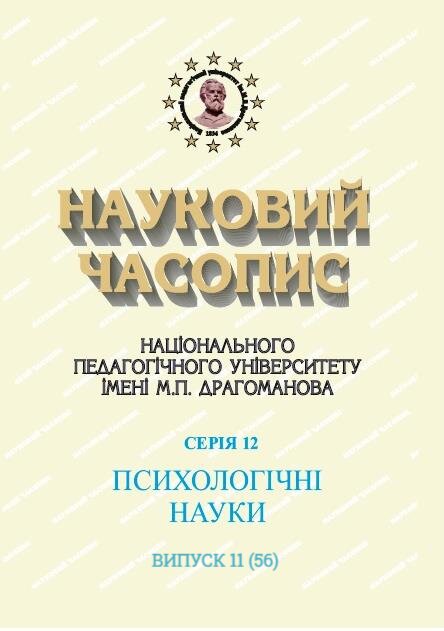FACTORS OF MANIFESTATION AND PREREQUISITES FOR THE FORMATION OF THE PROFESSIONAL TEACHERS BURNOUT SYNDROME
DOI:
https://doi.org/10.31392/NPU-nc.series12.2020.11(56).05Keywords:
“professional burnout” syndrome, stress, resistance, exhaustionAbstract
Pedagogical work is one of the most psychologically stressful types of work. Such a professional workload requires significant neuro-psychological resources for the implementation of pedagogical activities. Therefore, the problem of burnout is especially relevant for such professions that relate to the interaction in the system “man-man”. In Ukraine, this problem has been studied not so long ago. Therefore, empirical data for a complete and in-depth study of the issue is clearly lacking. However, every researcher who has at least to some extent been involved in the study of this problem is aware of its importance and relevance today. The purpose of the article: to determine the level of development and features of the manifestation of the syndrome of “professional burnout” in teachers; study of the influence of socio-demographic characteristics on the features of the syndrome of “professional burnout” in teachers. Objectives of the study: to determine the level of development of the syndrome of “burnout” in teachers; identify and characterize the main manifestations of the syndrome of “professional burnout” in teachers. The study was conducted according to the “Method of diagnosing the level of emotional burnout” by V. Boyko and with the help of a sample interview (Raigorodsky, 1998). The results of correlation analysis obtained using the SPSS program were used for statistical data processing. To identify statistically significant differences between different groups of teachers, the criterion of “chi-square” was used (Buul & Zeffel, 2002). The obtained results of the conducted theoretical and empirical research made it possible to assess the prevalence of the syndrome of “professional burnout” among teachers. The article reveals the peculiarities of the syndrome in teachers. The conclusion that the dominant component in the syndrome of “burnout” in teachers is “resistance” is substantiated; The most common type of behavioural reactions in the syndrome is the expansion of the sphere of saving emotions, which inevitably affects both the well-being of the teacher and his relationships with others. The relationship between socio-demographic determinants and the “burnout” syndrome is shown. The necessity of further development of the theoretical doctrine of “burnout syndrome” in modern conditions of educational activity, as well as further development of psycho prophylactic and psycho correctional means of working with employees of pedagogical professions who have signs of “burnout” is substantiated.
References
- Borisova, L.G. (1993). Soczialnoe kachestvo professionalnoj gruppy [The social quality of the professional group]. 45-55 [in Russian].
- Byuyul, A., & Czyofel, P. (2002). SPSS: iskusstvo obrabotki informaczii. Analiz statisticheskikh dannykh i vosstanovlenie skrytykh zakonomernostej [SPSS: The Art of Information Processing. Analysis of statistical data and recovery of hidden patterns]. Sankt-Peterburg: OOO «DiaSoftYuP». 608 [in Russian].
- Burke, R.J., & Greengalass, E. (1995). A longitudinal stydy of psychological burnout in teachers Human Relation. V. 48(2). 187-202.
- Vershlovskij, S.G. (1994). Uchitel krupnym planom [Close-up teacher]. Soczialno-pedagogicheskie problemy uchitelskoj deyatelnosti. Sankt-Peterburg. 32 [in Russian].
- Daniel, J., & Shabo, (1993). Physchological burnout in professional with permanent communication. Studia-Physchologica. V. 35(4-5). 412-414.
- Zajchikova, T.V. (2003). Diagnostika ta profilaktika sindromu profesijnogo vigorannya u vchiteliv: Metodichni rekomendacziyi [Diagnosis and prevention of burnout in teachers Guidelines]. Kiyiv, Rivne, 24 [in Ukrainian].
- Karamushka, L.M., & Zajchikova, T.V. (2002). Problema sindromu «profesijnogo vigorannya» v pedagogichnij diyalnosti v zarubizhnij ta vitchiznyani`j psikhologiyi [The problem of the syndrome of "professional training" in pedagogical activity in foreign and vital psychology]. Aktualni problemi psikhologiyi. Tom.1. Kiyiv : Institut psikhologiyi im. G.S.Kostyuka APN Ukrayini. 5, 210-217 [in Ukrainian].
- Kolesnikov, L.F. (1985). Rezervy effektivnosti pedagogicheskogo truda [Reserves of the effectiveness of pedagogical work]. Novosibirsk, 32-43 [in Russian].
- Orel, V.E. (2001). Fenomen «vygoraniya» v zarubezhnoj psikhologii: empiricheskie issledovaniya i perspektivy [The phenomenon of "burnout" in foreign psychology: empirical research and prospects]. Psikhologicheskij zhurnal, 22(1), 90-101 [in Russian].
- Rajgorodskij, D.Ya. (1998). Prakticheskaya psikhodiagnostika. Metodiki i testy. Uchebnoe posobie [Practical psychodiagnostics. Techniques and tests. Tutorial]. Samara : Izdatelskij Dom «BAKhRAKh», 161-169 [in Russian].
- Formanyuk, T.V. (1994). Sindrom «emoczionalnogo sgoraniya» kak pokazatel professionalnoj dezadaptaczii uchitelya [The syndrome of "emotional burnout" as an indicator of professional maladjustment of a teacher]. Voprosy` psikhologii. 6, 57-64 [in Russian].

